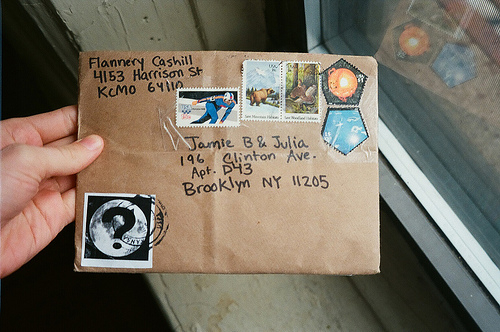
高中英语自荐信作文高级句子【一】
第三次课: 分词在句子中的用法
教学目标: 使学生初步了解及在句子使用分词
教学内容:
一、 动名词及不定式作业讲解
二、分词
现在分词和过去分词两种。
作为谓语,现在分词和be 一起构成进行时;过去分词和be一起构成被动语态,和have一起构成完成时。
例如:
I am reading a novel by Maupassant. 我正在看一本莫泊桑写的小说。(现在分词和be 一起表示主语正在进行的动作。)
Mr. Robinson has drunk five glasses of wine already. 鲁宾逊先生已经喝了五杯酒了。(过去分词和have 一起表示主语已经完成的动作。)
The gold fish bowl was broken by Xiao Tao just now. 金鱼缸刚才被小陶打破了。(过去分词和be 一起表示主语是动作的承受者。)
作为非谓语形式,分词可用作形容词和副词,在句子中充当定语、表语、补语和状语。但它仍保持动词的一般特征,可以有自己的宾语和状语。分词和自己的宾语、状语构成分词短语。 现在分词有一般式和完成式。它的一般式表示和谓语动词所表示的动作同时发生的行为或存在的状态;它的完成式(having + 过去分词)表示在谓语动词所表示的动作之前发生的动作或存在的状态。
现在分词有主动语态和被动语态(being + 过去分词。
过去分词只有一般式,表示在谓语动词所表示的动作之前发生的动作。过去分词(及物动词)本身可以表示被动的含义,因而没有别的被动形式。
例如:
Having failed three times, he didn’t want to try again. (=As he had failed three times, he didn’t want to try again. 他失败了三次,不想再干了。(having failed 表示发生在前的动作)
Walking along the sands, Crusoe saw in the sand the mark of a man’s foot. (=While he was walking along the sands, Crusoe? 克鲁索沿着沙滩走的时候,看见沙上有人的脚印。(walking 表示同时发生的动作)
The question being discussed seems important. (=The question is being discussed. It seems important. 正在讨论的问题似乎很重要。
The old days are gone. 旧时代一去不复返了。(gone 表示完成的状态)
I had my hair cut yesterday. 我昨天理发了。(cut 是及物动词的过去分词,表示“被人理发”。) 分词的否定形式是在分词短语前面加上not, never等否定词构成。
例如:
Not fearing the fire, the child touched and got a finger burnt. 小孩儿不知道怕火,用手去摸,把手指烫了。
Not knowing how to find the subway, I asked a policeman for help. 我不知道怎样找到地铁,就去找警察帮忙。
(一)现在分词和过去分词的区别
(1)在语态上现在分词表示主动的意思,表示它所修饰的人或物的行为;及物动词的过去分词表示被动的意思,表示它所修饰的人或物是动作的承受者。换言之,现在分词是它修饰
的成分所作出的动作,过去分词是它修饰的成分所承受的动作。
例如:
convincing facts 有说服力的事实 / convinced audience 被说服了的听众
the exploiting class 剥削阶级 / the exploited class被剥削阶级
a frightening dog一条让人害怕的狗 / a frightened dog一条被吓坏了的狗
driving gears主动齿轮 / driven gears从动齿轮
(2)在时间上,现在分词往往表示动作正在进行,过去分词表示动作已完成。
例如:
the rising sun (正在升起的太阳 / the risen sun(升起的太阳)
the falling rain(正在下的雨)/ the fallen leaves(落下的树叶)
stolen money(被盗的钱/偷来的钱)/ill-gotten wealth(不义之财)
a high-flying kite(高飞的风筝)
再看一些例子:
boiling water 沸腾的水/boiled water 开水/developing countries 发展中国家/developed countries 发达国家/an exciting story 令人激动的故事/ excited people 激动的人们
(2)在时间上,现在分词往往表示动作正在进行,过去分词表示动作已完成。
再看一些例子:
surprising news令人惊讶的消息/a surprised man受惊吓的人/an inspiring leader具有号召力的领袖/the inspired soldiers受到鼓舞的士兵/a delighted speech令人高兴的演说/the delighted audience(感到高兴的听众/a moving film动人的电影/the moved children受到感到的孩子们/a box containing tea装茶叶的盒子/the tea contained in a box装在盒里的茶叶/ falling snow正在下的雪/fallen snow box落在地上的雪
(3)做表语时的不同。现在分词做表语表示主语所具有的特征,意思是“令人如何”。过去分词多表示主语所处的状态,意思是“感到如何”。
例如:
His lecture is disappointing。I’m disappointed。他的演讲令人失望。我感到失望。
We are surprised to hear the news。The news is surprising。我们听到那消息吃了一惊。那消息令人吃惊。
The situation is encouraging。 We’re encouraged。形式使人鼓舞。我们感到鼓舞。
常用的还有:amusing/amused,astonishing/astonished,disappointing/disappointed,exciting/excited,frightening/frightened,interesting interested,moving/moved, relaxing/relaxed,satisfying/satisfied,shocking/shocked,surprising/surprised,terrifying/terrified,tiring/tired,worrying/worried等等。
(4)做状语的区别,分词短语在句中可做时间、原因、方式、伴随状语。现在分词的动作和谓语动作同时或几乎同时发生、意思是主动的。而过去分词的动作在谓语动作之前发生、意思是被动的。
例如:
Seeing nobody at home,she decided to leave them a note。看到没人在家,她决定给他们留个条。(主动意义,几乎同时
The secretary worked late into the night,preparing a speech for the president。秘书工作到晚上很晚,给总统准备一篇演说。(主动意义,同时
Tired of the noise,he closed the window。对噪音感到厌烦,所以他把窗户关上。(被动意义,
在谓语之前
Deeply moved,she thanked me again and again。她深深地受了感动,再三谢我。(被动意义,在谓语之前
Persuade by my mother,she gladly went there alone。在我母亲劝说下,她才高兴地独自去那里。(被动意义,在谓语之前
如果现在分词的动作在谓语动作之前发生,现在分词要用完成形式,但意思仍然是主动的。 例如:
Having watered the vegetables,they began to pick up the Apples。=After they had watered the vegetables,they began to pick up the apples。他们浇完了蔬菜之后就开始摘苹果。 Having finished the work,he packed his tools and left。完工后,他收拾起工具走了。 分词做状语时,前面可用连词或介词。
例如:
After eating my dinner quickly,I went to see Jim off。我赶快吃过晚饭就去给吉姆送行。 Though built before the Second World War,the engine is still in good condition。尽管是在二战以前建的,这引擎仍然处于良好状态。
Unless paying by credit card,please pay in cash。如果不用信用卡付款,请用现金付。 Tom will never do this unless compelled。汤姆永远也不会干这种事,除非被逼无奈。 She’s been quite different since coming back from America。从美国回来后,她大变了。
(二)用法
1.作定语。作定语的分词通常放在被修饰的名词之前。如果被修饰的词是something,anything,everything,nothing等,则分词放在这些词之后。分词短语通常放在被修饰的名词之后。
例如:
This is an interesting book。(=This is a book。It is interesting。这是一本有趣的书。
There is something interesting in the news。(=There is something in the news。 It is interesting。消息中有些有趣的事。
The man sitting by the window is our math teacher。(=The man who is sitting by the window is our math teacher。靠窗户坐着的那个人是我们的数学老师
The machine run by the old worker is made in Shanghai。(=The machine that is run by the old worker is made in Shanghai。那位老工人开的机器是上海造的。
Most of students singing were girls。(=Most of the students who were singing?唱歌的学生多数是女生。
Many of the villagers questioned refused to answer。(=Many of the villagers who were questioned?被问的许多村里人都拒绝。
注意:(1)分词作定语与动名词作定语的区别:
分词和它所修饰的名词有逻辑上的主、谓关系。动名词则没有这种关系,而表示它所修饰的词的用途或有关动作。
现在分词 动名词
A sleeping child(a child who is sleeping正在睡觉的孩子 A sleeping car(a car for sleeping卧车
A flying bird(a bird that is flying飞鸟 A flying course(a course for flying飞行课程
A swimming girl(a girl who is swimming游泳的女孩 A swimming pool(a pool for swimming游泳池
The running water(the water that is running流水 The running track(the track for running跑道 现在分词和它所修饰的名词都要重读,动名词所修饰的名词则不必重读。
(2)现在分词作定语时,它表示动作正在进行或与谓语动词所表示的动作同时发生(或差不多同时发生。
例如:
Who is the boy dancing over there?在那儿跳舞的少年是谁呀?
The girls swimming in the sea were in danger。 在海里游泳的姑娘们有危险。
如果两个动作在时间上有先后,一般不能用现在分词作定语,而往往用主从复合句结构。 例如:
The man who has gone to Shanghai will be back again。到上海去的那个人会回来的。
The teacher wants to talk to the students who smashed the windows。老师要找打破了窗子的那个学生谈话。
(3)be的现在分词being不能用作定语(可用作状语或被动语态中的助动词。表示这种概念时,也用主从复合句结构。
例如:
He has a brother who is a worker。他有一个当工人的兄弟。
2、作状语。分词和分词短语作状语时,可以表示时间、原因、行为方式等意义。表示时间和原因的分词短语相当于对应的状语从句。
例如:
Seeing the teacher entering the room,the students stood up。(=When the students saw the teacher entering the room,They stood up。学生们看见老师走进房间,都站了起来。 (时间
Heated,the Metal expands。 (=The metal expands if /when it is heated。金属受热而膨胀。(条件、时间
Being excited,I couldn’t go to sleep。(=As I was excited ,I couldn’t go to sleep。我兴奋得睡不着觉。(原因
Being a student,he was interested in sports。(=As he was a student,he was interested in sports。 他是个学生,所以对体育运动感兴趣。(原因
Inspired by Dr.Yang’s speech,Li Hua and his classmates decided to study physics harder。(=As they were inspired by Dr.Yang’s speech,Li Hua and his classmates decided to study physics harder。李华和他的同学们受到杨博士讲话的鼓舞,决定更加努力学习物理。 (原因 The children went away laughing。=The children went away。They laughed as they went。孩子们笑着走开了。(行为方式
The professor stood there,surrounded by many students。(=The professor stood there。He was surrounded by many students。教授站在那里,许多学生围着他。(行为方式
While reading the newspaper,father nodded from time to time。(=While he was reading the newspaper,father nodded from time to time。看报时,父亲不时地点头。(时间(分词前,可加表示时间的连词while或when。
3、作宾语补足语。
例如:
Can you get the machine going again?你能使机器再动起来吗?
You should have your hair cut。你该理发了。
I saw him coming last night。我昨天晚上看见他来了。
4、作表语。
例如:
The film is very moving。这部影片很感人。
Your homework is well done。你的作业做得好。
The visitors looked surprised.参观者看上去很惊讶。
The boys were seen walking on the grass。有人看见孩子们在草地上散步。
5、作句子独立成分(分词有自己的逻辑主语时,称为独立主格结构。)
例如:
Flags flying,the army men marched in the streets。旗帜飘扬,军队在街上行进。
All his ribs broken,he lay half dead。他的肋骨全部折断,半死不活地躺着。
分词(短语作状语时,其逻辑主语必须与句子的主语一致。如果不一致,必须用独立主格结构来表示,也就是在分词前面加上它的逻辑主语。
My wife had a long talk with Sally, explaining why she didn’t want the children to play together我妻子与莎莉谈了很长时间,解释她为什么不想让孩子们在一起玩。(现在分词explaining是句子主语my wife做的动作,它们之间是主动关系
Given more attention,the trees could have grown better。如果对这些树多关心一些,它们本来会长得更好。(过去分词given表示的动作是句子主语the trees承受的动作,它们之间是被动关系
We explored the caves,Peter acting as guide。我们到那山洞探险,彼得做向导。 (独立主格 The train having gone,we had to wait another day。分词短语做状语时,前面可以加上连词或介词,但是分词短语和句子之间不能用并列连词(如but,and,因为并列连词接的是两个并列成分,而分词短语只是全句的一个状语部分。分词和主句之间可用逗号。
例如:
误:Having been told many times,but he still couldn’t understand it。
正:He was told many times, but he still couldn’t understand it。
注意:(1)分词作状语时,逻辑主语即句子的主语;否则要用从句或独立主格结构来表示。 例如:
Looking out of the window,I saw lots of people there。(=When I looked out of the window,I saw lots of people there。
我往窗外一看,看见那儿有许多人。 (looking out of the window的逻辑主语,就是句子的主语I。
(2)在see,hear,watch,notice等动词后,用动词不定式作宾语补语,通常表示(强调动作从开始到结束的全过程。如果用现在分词作宾语补语,则通常表示动作正在进行。 例如:
We sat two hours and watched the teacher make the experiment。我们坐了两个小时,看老师做实验。(两小时一直在看老师做实验
We passed by the classroom and saw the teacher making the experiment。我们走过教室,看见老师在做实验。(只是在走过教宰的一刹那间,看见老师正存做实验
I saw him enter the room, unlock a drawer, take out a document, photograph it and put it back。我看见他走进房间,打开抽屉,拿出一份文件,拍了照又放回去(表示一个接一个的一系列动作的全过程时,用动词不定式。
高中英语自荐信作文高级句子【二】
1、含羞草像一个害羞的姑娘,只要在它的叶片上轻轻一碰,它就合拢起来,枝条也跟着低垂下来,好像不敢见人似的。
2、瞧,果园里的水果在向我们招手呢!苹果羞红了脸,石榴在树上摇摇欲坠,桔子像一个个金色的小灯笼,葡萄一串串紫里透红。
3、雪花象一只只从远方飞来的白蝴蝶,她们在空中翩翩起舞,嬉笑着,逗闹着,看着这些蝴蝶,我觉得雪是冬天最美丽的女儿。
4、棉花杆儿长得很粗壮,棉桃大得像小馒头。待到棉桃“开嘴”的时候,雪团似的棉花像白雪铺地,把这里装饰成银色的世界。
5、一道闪电像一支离弦之箭直射天空,在夜空里勾画出一道美丽的折线。转瞬间,天昏地暗,大地又重新回到了黑暗之魔的手中。
6、月亮象小船,弯弯的两头尖;月亮象盘子,圆圆的好清洁;月亮象孩子,时而和我捉迷藏;月亮象天使,守护着你和我!
7、突然,闪电现身了,放射出更加强烈的光芒,如一利斧,劈开了云雾!那一瞬间,只有它的光芒覆盖了风雨,映红了大地。
8、夏天的雨,干脆,强劲;夏天的的雨,利落,爽快;夏天的的雨,生动,豪爽;夏天的雨,毫不拖泥带水;夏天的雨,像个男人!
9、冬天的天气千变万化,刚刚天气晴朗,转眼间阴了,雪花纷纷飘了下来,像一个魔法师一样瞬间把我们的学校变成了银色的城堡。
10、月亮像个害羞的姑娘,羞答答地从后山露出半个脸,偷偷地向人间窥视,直到发现没有什么动静,才一闪身,出现在天空中。
11、家乡的大蒜可大了,扁圆形的身子长得胖乎乎的,似乎快要把身上的“衣服”给顶破似的,给人一种精神饱满,积极向上的感觉。
12、秋天来到了,山楂树上挂满了玛瑙似的红果,整林的山楂像一个个红色的小灯笼,悬挂在枝头、枝间,叫人看了直流口水。
13、一棵棵松树,褐色的树干,足有碗口粗,笔直笔直的,满树的松叶绿得可爱,活像一把张开的绿绒大伞,风一吹,轻轻摇曳。
14、走进果园,扑鼻而来一阵浓浓的果香。火红的苹果像一个个的小红灯笼簇拥在树上,小鸟在旁边欢快的唱歌,好似优美的奏鸣曲。
15、啊!真是一只小喜鹊。黑褐色的羽毛泛着蓝色的光泽,腹部的绒毛像雪那样白,长长的尾巴上卜翘动着,嘴里还在唱着。
16、那满天的星斗,像黑夜里眨动的眼睛,像一颗光闪闪。亮晶晶的夜明珠。而天空则像无边的海洋,上面闪动着点点银光。
17、我在远处看那些火红的枫叶像一团团火在燃烧,那些从树上飘落下来的叶子,像一只只红色的蝴蝶在空中自由的飞舞。
18、头上的毛像橄榄色的头巾,绣满了翠绿色的花纹。背上的羽毛像浅绿色的外衣。腹部的羽毛,像赤褐色的衬衫。
19、神仙掌是黄沙中的碧玉,是枯海中的岛屿,是荒原上的好汉;它们给火热如焚的戈壁,带来了活力,带来了昌盛,也带来了奥秘的希看的颜色。
20、“唧唧啾啾”那是画眉鸟婉转悦耳的叫声,听起来多像歌唱家在唱一首优美动听的歌曲,又像演奏家在吹悠扬悦耳的笛子。
21、长颈鹿清早起来在森林里昂首阔步,慢吞吞地移动着长腿,扭动着长长的脖子,那副悠然自得的样子,很像个在游逛吟诗的老夫子。
22、雪越下越大,有的像天女撒下的花瓣;有的像顽皮的小孩在翻跟斗;有的抱在一起,像玉雕的圆球;还有的像树叶一样优雅、端庄地飘落下来。
23、春天,隐藏在那柳树枝上。那些嫩绿嫩绿的叶芽,像一位少女,亭亭玉立,那么清新雅致。而那柳条像少女的裙带,随风飘舞。
24、那万里无云的天空本是浅蓝浅蓝的,像明净的海水,现在蓝色渐渐地加重,越来越蓝,越来越浓,像是海水在一层层地加深。
25、月亮像一个含羞的少女,一会儿躲进云间,一会儿又撩开面纱,露出娇容,整个世界都被月色浸成了梦幻般的银灰色。
26、粉红色的梅花如情窦初开的少女的面颊,带着十二分的羞涩,如描似画,柔情似水。置身其中赏心悦目,遐思无限,流连忘返。
27、秋姑娘的手是一把扇子,扇啊扇啊,扇得稻谷弯了腰,萝卜涨红了脸颊,骄傲的油菜花在田野里,抬起头来,用力向外张望呢!
28、春天来了,泉水汩汩地冒着泡泡,小草也偷偷地从土里钻出来,嫩嫩的,山坡上绿油油地,洁白的小羊羔像一团团棉花,在草原上撒欢。
29、只见一只花孔雀把尾巴抖得哗哗响,那漂亮的尾巴就像仙女手中的彩扇,慢慢散开,又像透亮的珍珠撒在它身上,非常美丽。
高中英语自荐信作文高级句子【三】
按要求改写句子知识点梳理
一、概述
按要求改写句子主要考查学生对句子结构的掌握以及用不同句型表达同一意思的能力。考查所涉及到的句子类型有一般疑问句、否定句、反意疑问句、选择疑问句、对划线部分提问、感叹句、保持原句意思、合并成一句、简单句和复合句之间的互换以及改为被动语态等。
二、解题时需注意的几个要点
1、时态:不同的时态相对应的助动词
一般现在时:谓语动词用原形(主语为第三人称单数时,动词加s或es,变否定句、疑问句时助动词为do或does)
一般过去时:谓语动词用过去式,变否定句、疑问句时助动词为did.
现在完成时:助动词have/has+动词的过去分词
过去完成时:助动词had+动词的过去分词
一般将来时:will/be going to +动词原形
过去将来时:would/was or were going to +动词原形
现在进行时:am/is/are+动词的现在分词
过去进行时:was/were+动词的现在分词
2、语态:主动语态变为被动语态的谓语结构
一般现在时:am/is/are+动词的过去分词
一般过去时:was/were+动词的过去分词
一般将来时:will be+动词的过去分词
情态动词:can/may/must/need等情态动词+be++动词的过去分词
3、改反意疑问句时注意hardly, never, seldom, few, little, no等词表达的是否定意义,变反意疑问句时用肯定形式。
4、在合并句子时,有些连词如not only…but also…, neither…nor…, either…or…是就近原则,连接两个主语时动词形式取决于与动词邻近的主语。而both…and…连接两个主语时,主语是复数。
5、简单句和复合句之间的互换常见的有:带有疑问词的宾语从句改为特殊疑问词+to+动词原形的不定式;结果状语从句so…that…改为enough to或too…to…的简单句。
6、保持原句意思改写句子时注意时态不变。
三、习题
练习一
1. We do our homework every evening. (改为否定句)
We _________ ________ our homework every evening. 对划线部分提问
________ ________ do they have a class meeting?
3. She could hardly understand this passage. (改为反意疑问句
She could hardly understand this passage, _________ __________?
4.The manager told him how to get useful information. (改为否定句
The manager _________ _________ him how to get useful information.
5. Tom’s sister can speak English and Japanese very well. (改为反意疑问句
Tom’s sister can speak English and Japanese very well, _________ _________?
对划线部分提问
_________ _________ he live twenty years ago?
7. Sam does some cleaning in the morning. (改为否定句
Sam _________ do _________ cleaning in the morning.
对划线部分提问
_________ _________ have the students worked on the survey?
9. Your father used to ride a bike. (改成反意问句)
Your father used to ride a bike, _______ ________? (对划线提问)
__________ ___________ the population of Germany?
11. Mr. Wang washes his car once a month. (改为一般疑问句)
Mr. Wang (对划线部分提问
will Susan come back from Athens?
13. My friends lost their way when they were traveling in Hong Kong. (改为一般疑问句
________ your friends ________ their way when they were traveling in Hong Kong?
14. 对划线部分提问
________ ________ has Yao Ming been in the Rocket Team?
15. She put the digital camera on the bed just now. (改为否定句
She _________ _________ the digital camera on the bed just now.
16. Mark's flown to Hainan Island for winter holidays. (改为反意疑问句
Mark's flown to Hainan Island for winter holidays, _________ _________?
(专辑. (划线部分提问
_________ did Super Girl Zhou Bichang _________ to Vienna?
18. I’ve already saved enough money to buy a new car. (改为否定句
I ________ saved enough money to buy a car ________.
19. Lily used to have long straight hair. (改为反意疑问句
Lily used to have long straight hair, ________ ________?
20. He has already been there .(改为一般疑问句
__________ he been there __________?
21.They decided that they wouldn't have the picnic because of the bad weather. (改为简单句
They decided __________ _________ have the picnic because of the bad
weather.
22. The English people hardly ever shake hands between the strangers .( 改为反意疑问句
The English people hardly ever shake hands between the strangers, __________ __________?
23. They grew some sunflowers in their garden last year.(改为否定句)
They __________ __________ any sunflowers in their garden last year.
24. Jane drinks milk every morning.(改为一般疑问句)
_________ Jane ___________ milk every morning? (就划线部分提问)
___________ map ___________ to Class 4?
26. You can choose only one of the two: a mini-TV or a DVD player. (改为选择疑问句
you want a mini-TV a DVD player?
27. That detective film is so amazing. (改为感叹句)
___________ ___________ amazing detective film!
28. He has some money left.(改成否定句)
He money left.
29. (划线部分提问)
do the members of the film society meet?
30. His mother knew why the little boy was unhappy all day. (改为一般疑问句
_______ his mother _______ why the boy was unhappy all day?
31. He looks very funny with that hat on. (改为感叹句
_______ _______ he looks with that hat on!. 对划线部分提问
_______ _______ they build this factory?
33. I have already finished the test paper.(改为否定句)
I ________ finished the test paper ________.
34. Johnson denied cheating in the competition.(改为反意疑问句)
Johnson denied cheating in the competition, ________ ________? (对划线部分提问) ________ ________ the story need to be funny?
36. Sam does some cleaning in the morning. (改为否定句
Sam _________ do _________ cleaning in the morning.
对划线部分提问 _________ _________ have the students worked on the survey?
38. (对划线部分提问) _________ _________ has he been a top fashion designer?
39. 对划线部分提问
________ ________ will they move into the new school?
40. to go to the People’s Square by underground. (对划线部分提问
________ _______ did it take you to go to the People’s Square by underground?
练习二:
1. Gold is less valuable than diamond. (保持句意不变
Gold is ________ ________ valuable as diamond.
2. He told the children to go and watch his tank of Ghost fish. (改为被动语态 The children ________ ________ to go and watch his tank of Ghost fish.
3. Unless I have a quiet room, I cannot do any work. (保持句意不变)
I cannot do any work ________ I _________ have a quiet room.
4. The manager arrived here a few minutes ago. (保持句意不变)
The manager has _________here ________ a few minutes.
5. They will send him to work in Japan for one year. (改为被动语态
He will ________ _________ to work in Japan for one year.
6. The words on the notice board are very small. I can’t see them clearly.(保持句子原意
The words on the notice board are small I can’t see them
clearly.
7. We can solve the problems with the help of the teacher. (改为被动语态 The problems can _________ _________ with the help of the teacher.
8. We can’t finish the work in such a short time. (保持原句意思
It’s _________ _________ us to finish the work in such a short time.
9. We must keep the noise under 50 dbs.(分贝(改成被动语态)
The noise must ________ _______ under 50 dbs here.
10. Mike doesn’t like classical music. Billy doesn’t either. (合并成一句) _________ Mike nor Billy __________ classical music.
11. The room is so dirty that we can’t live in it.(保持句意不变)
The room isn’t __________ _________ for us to live in.
12. No one knows when we will start tomorrow. (保持原句意思)
No one knows start tomorrow.
13. The Smiths will invite the professor to take part in the party. (改成被动语态 to take part in the party by the Smiths.
14. If you are not brave, you’ll lose your last chance.(保持原句意思)
you are ’ll lose your last chance.
15. They store much information in the computer. (改成被动语态
Much information ________ ________ in the computer.
16. Don’t throw rubbish here and there. Our teacher said to us. (合并为一句
Our teacher told us ________ ________ throw rubbish here and there.
17. If John doesn’t apologize for what he did, I will tell the teacher about his bad behavior.
(保持原句意思)
_______ John _______ for what he did, I will tell the teacher about his bad behavior.
18. I don't know where we can grow vegetables in the city. (改为简单句 I don't know _________ _________ grow vegetables in the city.
19. People used to enjoy themselves chatting on MSN when it worked well. (保持句意基本不变
People used to _________ a lot of _________ chatting on MSN when it worked well.
20. If you don’t improve your handwriting, you will lose marks in the exam. (合成同义句
You will lose marks in the exam ________ you ________ your handwriting.
21. To go fishing is fun. (句意不变 )
_____ is fun _____ ______ fishing.
22. Dick was so short that he couldn’t touch the top of the bookshelf.(保持句意基本不变)
Dick wasn’t __________ __________ to reach the top of the bookshelf.
23. “Can I borrow your bike for a while or not?”( 保持句意基本不变)
Tom asked his sister __________ he __________ borrow her bike or not for a while.
24. The couple couldn’t decide which flat they should choose at first. (保持原句意
思)
The couple couldn’t decide which flat at first.
25. Meaningless information is difficult for the little boy to remember. (保持原句意思)
is difficult for the little boy remember meaningless information.
26. People throw away millions of plastic bags in our city every day. (改成被动语态)
Millions of plastic bags away in our city.
27. She was so careless that she couldn’t find the mistakes in her test paper. (保持句意基本不变
She was _______ _______ to find the mistakes in her test paper.
28. We will hold the next Olympic Games in Beijing in 2008.(改为被动语态)
The next Olympic Games will _______ _______ in Beijing in 2008.
29. The elderly man pushed the birds into the river.(改为被动语态)
The birds ________ ________ into the river by the elderly man.
30. Dolphins are so clever that they can follow the instructions.(保持句意基本不变) Dolphins are ________ ________ to follow the instructions.
31. We can’t finish the work in such a short time. (保持原句意思
It’s _________ _________ us to finish the work in such a short time.
32. They invited the astronaut and his wife to the party on Christmas Eve.(改为被动语态
The astronaut and his wife _________ _________ to the party on Christmas Eve.
33. The little girl didn’t go to bed unless the grandmother told her a story. (保持句意基本不变
The little girl didn’t go to bed _________ the grandmother _________ tell her a story.
34. The plane is so big that it can carry 300 passengers at one time. (改为简单句)
The plane is big _________ _________ carry 300 passengers at one time.
35. Did they know the answer to the question? Ididn’t know… (合并为一句 I didn’t know ________ they had ________ the answer to the question.
Keys
练习一
1. don’t do 2. How often 3.could she 4.didn’t tell 5.can’t she
6.where did 7.doesn’t any 8.How long 9.didn’t he 10.What is
高中英语自荐信作文高级句子【四】
1.我们这个世界,从不会给一个伤心的落伍者颁发奖牌。
2.人类最大的灾难就是自已瞧不起自已。
3.健康的身体是实目标的基石。
4.目标再远大,终离不开信念去支撑。
5.如果你很聪明,为什么不富有呢?
6.炫耀是需要观众的,而炫耀恰恰让我们失去观众。
7.每一个成功者都有一个开始。勇于开始,才能找到成功的路。
8.吃别人吃不了的苦,忍别人受不了的气,付出比别人更多的,才会享受的比别人更多。
9.站在巨人的肩上是为了超过巨人。
10.当你感到悲哀痛苦时,最好是去学些什么东西。学习会使你永远立于不败之地。
11.人生舞台的大幕随时都可能拉开,关键是你愿意表演,还是选择躲避。
12.实现梦想比睡在床上的梦想更灿烂。
13.积极向上的人总是把苦难化为积极向上的动力。
14.热情和***可以突破一切难关。
15.相信你行,你就活力无穷。
16.你要决心成功就要做自已的国王。
17.昨天下了雨,今天刮了风,明天太阳就出来了。
18.不会生气的人是愚者,不生气的人乃真正的智者。
19.千万人的失败,都有是失败在做事不彻底,往往做到离成功只差一步就终止不做了。
20.信念是一把无坚不摧的利刃。
21.爬上最高的境界,你会陡然发现:那里的景色竟然是你司空见惯的。
22.你在学习上这种尝试精神很可贵。
23.通过云端的道路,只亲吻攀登者的足迹。
24.我为你今天的表现感到骄傲。
25.当一个人真正觉悟的一刻,他放弃追寻外在世界的财富,而开始追寻他内心世界的真正财富。
26.善待你的爱好,别让它们为学习让路,要让它们替学习服务。
27.松驰的琴弦,永远奏不出时代的强音。
28.用最少的悔恨面对过去,用最少的浪费面对现在,用最多的信心面对未来。
29.每一发奋努力的背后,必有加倍的赏赐。
30.不要让追求之舟停泊在幻想的港湾,而应扬起奋斗的风帆,驶向现实生活的大海。
31、经历,要是说起经历,我可谓是两朝元老。在人生坎坷的道路上,有许多障碍物阻挡着我前进,我必须历尽万难,来证明我的价值和意义的高尚。
32、想得开,想不开,最终还得想得开,何不提前想得开,找那么多憋屈干什么。放得下,放不下,最终都是被放下,何不快乐的放下,受那么多累心做什么。
33、经验是位出色的教师,只是在人生的短期培训班里他的学制太长,而收费又太贵。
34、每个人都有五个不停旋转的球:工作、健康、家庭、朋友和灵魂。工作是橡胶球,掉下去会弹起来;而另外四个都是玻璃球,掉了就碎了。
35、人生是一场遇见,总有一天,你会在不经意之间,遇见那个你最想成为的自己。
36、美好的回忆我总是记不清,我讨厌回忆,却总是在回忆里无法自拔。
37、在追逐人生成功的道路上会有坎坷,心里有光,也遍夷为平地。
38、对于自己的人生我和你都不是读者,而是作者。结局这种东西还是可以改变的吧。
39、人生的坎坷,大多因为自己不肯转弯或者总是逃避。
40、幸福人生需要三种姿态:对过去,要淡;多现在,要惜;对未来,要信。
41、听从命运安排的是凡人;主宰自己命运的才是强者;没有主见的是盲从,三思而行的`是智者。
42、人是可以快乐地生活的,只是我们自己选择了复杂,选择了叹息。
43、你想对知已诉说心事的时候,往往就是生活中遇到了烦恼的时候,人在痛苦悲伤时候是最无助的时候,每在这个时候,面对那个知你,懂你的人,你的心是不设防的,也最容易被感动。
44、独处,是一种非常重要的能力。一个人如若畏惧独处、讨厌寂寞、稍稍闲下来就有呼朋引伴的冲动,那至少能证明其精神力量还很薄弱。
45、人再豁达,也会有块心底的伤;心再冷漠,有时也会红了眼眶。走得再潇洒,途中也会有迷茫;活得再漂亮,背后也会有凄凉。不是你倦了,就会有温暖的巢穴;不是你渴了,就会有潺潺的山泉。每个人的内心,都有几处不为人知的暗伤。
46、须交有道之人,莫结无义之友。饮清静之茶,莫贪花色之酒。开方便之门,闲是非之口。
47、你有你的生命观,我有我的生命观,我不干涉你。只要我能,我就感化你。如果不能,那我就认命。
48、我们对于人生可以抱着比较轻快随便的态度:我们不是这个尘世的永久房客,而是过路的旅客。
49、当第一缕月光洒进我的窗户,我就开始想你,思念我们欢笑过的雪地,留下了无法抹去的足迹;思念我们曾拥有的甜蜜,不知你是否将甜蜜牢记!
50、在我们人生的大道上,肯定会遇到许多为难的事,但我们是不是知道,在前进的路上,搬开别人脚下的绊脚石,有时恰恰是为自己铺路?
51、一个人的一生,有轰轰烈烈的辉煌,但更多的是平平淡淡的柔美。人是需要一种平淡的,这种平淡无声无息,但又无处不在。
52、糊涂的人生观就在于要达观生活,知足常乐,他能看开一切,所以宠辱不惊、从容快乐。
53、人生总得要取舍,但太多的人是捡了生芝麻丢了熟西瓜;舍了熊掌取了鱼苗。
54、欢乐是希望之花,能够赐给她以力量,使她可以毫无畏惧地正视人生的坎坷。
55、人生的许多大困难,只要活着,没有什么是解决不了的,时间和智慧而已。
56、整个人生就是思想与劳动,劳动虽然是无闻的、平凡的,却是不能间断的。
57、一切恶法,本是虚妄的,你不要太自卑你自己。一切善法,也是虚妄的,你也不要太狂妄你自己。
58、面对成功或荣誉,不要狂喜,也不要盛气凌人,而是要把功名利禄看轻些、看淡些;面对挫折或失败,不要忧悲,也不要自暴自弃,而是要把厄运羞辱看远些、看开些。
59、有些人表面在一起,但心却无法在一起;有些人从没想过在一起,却自然而然的在一起;有些人千辛万苦终于在一起,却发现其实他们并不适合在一起。看不透,说不清,爱情是永恒的谜题。
60、小时候幸福是一件很简单的事,长大了简单是一件很幸福的事。
高中英语自荐信作文高级句子【五】
It ______ ______ ______ the train will be late.
答案:is likely that
2. It is likely that the typhoon will sweep across the island.
The typhoon ______ ______ ______ ______ across the island.
答案:is likely to sweep
3. I think trying to stop the couple quarrelling will be of no use.
I think it's ______ ______ ______ to stop the couple quarrelling.
答案:no use trying
4. Every time I was in trouble, he had no hesitation in helping me.
Every time I was in trouble, he came to help me ______ ______.
答案:without hesitation
5. He never hesitates to help if I have any problem.
He always helps me ______ ______ if I have any problem.
答案:without hesitation
6. I crossed the street so as not to meet him, but he saw me and came running towards me.
I crossed the street to ______ ______ him, but he saw me and came running towards me.
答案:avoid seeing
7. It seems that the students in that class have all passed the qualified exam.
All of the students in that class ______ ______ ______ ______ the qualified exam.
答案:seem to have passed
8. It seems that the boys of the class are playing football on the playground.
The boys of the class ______ ______ ______ ______ football on the playground.
答案:seem to be playing











